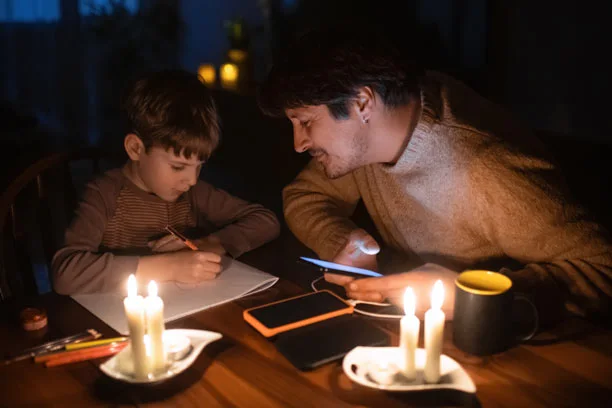What to Do if Your Power Goes Out in the Winter


Any power outage is an inconvenience, but extreme cold adds extra risk. Here's how to prepare for power outages in winter and what to do if it happens.
The big danger in a winter power outage, compared to the rest of the year, is the extreme cold. When a power plant in Nebraska had a fire and an explosion in February 2025, a whole town was without power, and the temperature plummeted to -30ºF.
If possible, have a generator installed ahead of time and make sure it’s working properly at the beginning of winter. If you don’t have one, you may be able to find one in stores during the power outage, according to Consumer Reports. Retailers can reroute supplies to places that are having a power outage in a day or two.
You may also be able to find a smaller, recreational generator that’s strong enough to power a space heater and charge your phone.
You can use a fireplace, wood stove or propane heater designed for indoor use. Make sure you have smoke and carbon monoxide detectors installed in your home.
If the sun is shining, have everyone in your family stay in a room that faces south. The sun plus your body heat will help the space stay a little bit warmer.
Windows and doors can let in cold air. Seal leaks with weather stripping or caulk at the beginning of winter. If the power is out and you haven’t done that, seal off windows with duct tape and plastic sheets, and use towels to block drafts from doors.
Layers trap heat between them, so they can help keep you warmer than one heavy layer. Make sure you don’t get overheated, since the moisture from sweating can make you cold. Have blankets and handwarmers available.
It can help you stay warmer at night if you use sleeping bags and set up a tent, if possible. The enclosed space can trap heat.
According to FoodSafety.gov, if you keep your refrigerator closed, the food in it should be safe for four hours. Your freezer should keep food frozen for 48 hours if it’s full, or 24 hours if it’s half-full. In either case, you should keep the door closed.
It’s a good idea to have some coolers on hand. That way, if the power outage lasts a long time, you can move food to a garage, porch or other cold area.
Turn on your faucets slightly so they drip. This helps keep water running through your pipes and makes them less likely to freeze. Open your kitchen and bathroom cabinets so warmer air reaches your pipes.
With winter power outages, you need to be prepared for cold temperatures. And you also need to take the same steps you would in the spring, summer or fall:
Winter storms and power outages can damage your home. Connect with your local Farm Bureau agent to review your homeowners or renters insurance and check that you have coverage in place for winter weather hazards.